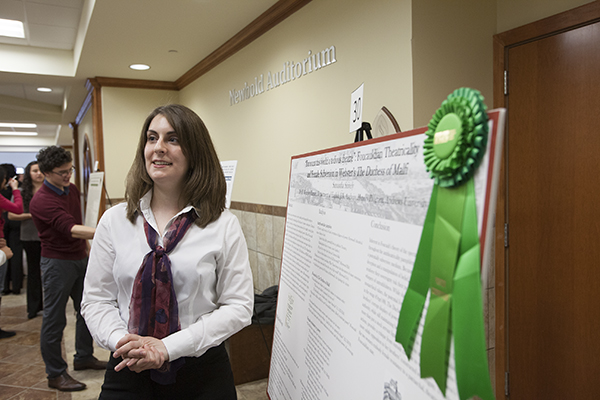J.N. Andrews Honors Program
Honors Links
About Honors
Since its beginning, the J. N. Andrews Honors Program has sought to provide challenging classroom experiences focused on critical thinking, discussion, and debate. Following in the footsteps of our namesake, the early Adventist scholar and missionary J. N. Andrews, the Honors Program strives to wed rigorous academic training with deep and abiding faith. In addition, the program’s culminating Honors Thesis provides a context in which undergraduate research endeavors flourish. For decades, the Honors Thesis project has served as the capstone of the Honors curriculum.
 The Honors Thesis experience brings together the intellectual energies and enthusiasm of students, seasoned professors and researchers, and the interdisciplinary Honors Council. The Honors Thesis process involves writing a formal research proposal document, defending that proposal before the Honors Council, and presenting the research findings first at the Honors Scholars and Undergraduate Research Poster Symposium and later at the Honors Thesis Symposium. The final papers are submitted to the Honors Program and to the university library where they are archived in hardcopy and digital format.
The Honors Thesis experience brings together the intellectual energies and enthusiasm of students, seasoned professors and researchers, and the interdisciplinary Honors Council. The Honors Thesis process involves writing a formal research proposal document, defending that proposal before the Honors Council, and presenting the research findings first at the Honors Scholars and Undergraduate Research Poster Symposium and later at the Honors Thesis Symposium. The final papers are submitted to the Honors Program and to the university library where they are archived in hardcopy and digital format.
 Undergraduate research prepares students for the transition into professional school, graduate school, and career employment. By requiring that students initiate investigative projects, design research models and methodologies, review the discoveries of previous scholars, and report in oral and written form on their own findings, the Honors Thesis appropriately caps the undergraduate Honors experience. Undergraduate research combines mastery of a body of knowledge with the application of critical thinking skills central to the learning and pedagogical methods of the Honors Program. It's a great pleasure to watch the maturation that takes place as students assume increasing ownership of their individual research work. Faculty members privileged to oversee Honors Thesis projects also benefit as some projects transform into joint conference presentations and publications.
Undergraduate research prepares students for the transition into professional school, graduate school, and career employment. By requiring that students initiate investigative projects, design research models and methodologies, review the discoveries of previous scholars, and report in oral and written form on their own findings, the Honors Thesis appropriately caps the undergraduate Honors experience. Undergraduate research combines mastery of a body of knowledge with the application of critical thinking skills central to the learning and pedagogical methods of the Honors Program. It's a great pleasure to watch the maturation that takes place as students assume increasing ownership of their individual research work. Faculty members privileged to oversee Honors Thesis projects also benefit as some projects transform into joint conference presentations and publications.